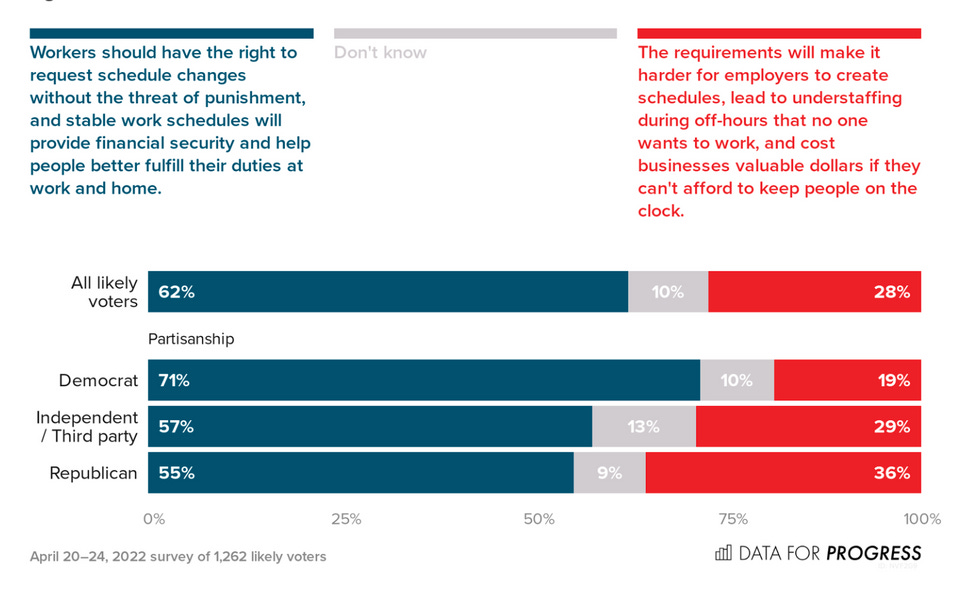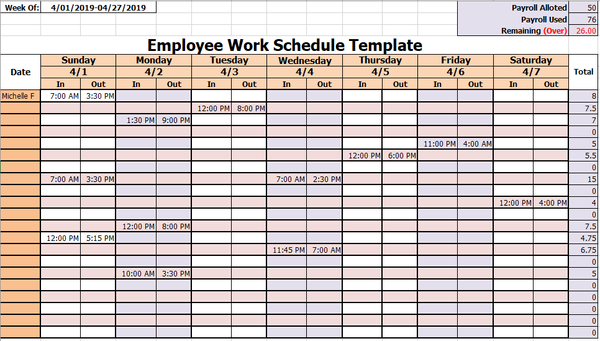Hey! Let's Talk About The 'Schedules That Work Act' And Why It's Great And Important
It's also supported by a majority of voters.
The very first thing I did when I first started managing a retail store, many years ago, was ask everyone what their preferred schedule was, and then make up a schedule for the next month, which then stayed relatively the same unless people needed particular days off. Why? Because one of my biggest frustrations everywhere I ever worked was that I never knew what my schedule was going to be for the next week. Not only were schedules frequently made the day before the week started, but sometimes even after that.
This sucked.
It really did. It meant I could never make plans or appointments, never be sure I was going to be able to be anywhere. It also meant I was kind of stuck because it was practically impossible to schedule job interviews. Even if I had healthcare, which I did not — as I was kept at 39 hours a week for that exact reason — it was impossible to schedule a doctor's appointment ahead of time.
It never made a lot of sense to me, since there was never any reason to change the schedule every week, and it was in fact much easier to just keep the same one (barring requested days off). Everyone always worked around the same amount of hours, and we usually had the same number of people on the floor for particular days and times.
It took me a while to realize that much like "we're just understaffed right now, we just need everyone to pull together for a while and not take days off until we hire someone," this was not a bug (or an oversight or a temporary situation) but a feature. It was done on purpose to make it difficult to leave and difficult for people to take days off.
Because of this experience, I am extremely personally jazzed about the "Schedules That Work Act," sponsored by Sen. Elizabeth Warren in the Senate and Rep. Rosa DeLauro in the House. As Data for Progress explains, it would "require employers to provide consistent and predictable work schedules."
And you know what? Everyone is jazzed about it. Data for Progress says "sixty-two percent of voters, including 55 percent of Republicans, 57 percent of Independents, and 71 percent of Democrats" support it. Those are some good numbers!

Introduced in February, the bills (H.R. 6670) (S.3642) would "permit employees to request changes to their work schedules without fear of retaliation and to ensure that employers consider these requests, and to require employers to provide more predictable and stable schedules for employees in certain occupations with evidence of unpredictable and unstable scheduling practices that negatively affect employees, and for other purposes."
Some of these practices include having employees be on-call, being cut early because things are slow, and other last-minute shift changes. These are all well and good for the employer, but if people don't know how many hours they're going to work, they don't know how much money they're going to have. If someone has kids, it's even worse, because they have childcare to factor in. It's also shitty to hire people to work part-time, and then make it impossible for them to have another job.
As the bill notes:
(4) Unfair work scheduling practices make it difficult for low-paid workers to—
(A) provide necessary care for children and other family members, including securing and maintaining stable child care;
(B) access and receive needed care for the workers’ own serious health conditions;
(C) pursue workforce training;
(D) get or keep a second job, which many workers need to make ends meet;
(E) plan for and access transportation to reach worksites; and
(F) qualify for and maintain eligibility for needed public benefits and work supports, such as child care subsidies and benefits under the supplemental nutrition assistance program, due to fluctuations in income and work hours.
Also:
A growing body of research demonstrates that unstable and unpredictable work schedules have significant detrimental impacts on sleep quality, mental health, and happiness, and are associated with unstable child care arrangements and negative health and behavioral outcomes for children. And impacts are likely to be the most severe for workers of color and their families, as workers of color are more likely than their White counterparts—even compared to White coworkers at the same company—to experience unstable work schedules. Unstable and unpredictable work schedules—and the work-family conflict they produce—are also associated with higher rates of turnover, which creates further instability for employers and workers.
I did not know about the research, but yes, this absolutely tracks with my own experience and the experience of literally everyone I know who has had a similar work situation.
The bill also notes that — shockingly enough — many workplaces that have implemented fair scheduling practices have seen increases in worker productivity, along with "reductions in absenteeism and workforce turnover, and increased worker morale and engagement." It's almost as if you don't have to psychologically torture your employees to get the results you want!
This has the potential to be an extremely popular bill, since it's certainly not just Democrats who have worked these kinds of jobs before. It's something President Joe Biden would do well to promote and encourage a vote on. Fifty-eight percent of workers in the United States have hourly jobs, so it's something where people would feel an immediate impact on their lives, and without spending a dime.
Do your Amazon shopping through this link, because reasons .
Wonkette is independent and fully funded by readers like you. Click below to tip us!




Trust fall b*s, and other corporate team-building games.in the rubbish with all of them.
don't forget the cereal bar.